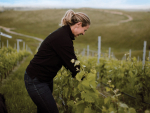Point of View: Home truths from the Chair of New Zealand Women in Wine
OPINION: “I’m a woman and I’m in wine. Why do we need Women in Wine?” I was asked this great question recently.
Lynnette Hudson is fresh off the plane from Austria when we speak, having run a Pinot Noir workshop and worked a sevenweek winemaking stint.
But life shows no signs of slowing down for the consultant winemaker, who is in full swing organising January’s Southern Pinot Noir Workshop being held in Hanmer Springs. Does she get time to sleep? “Sometimes,” she laughs.
The well-known winemaker cut her career teeth at Pegasus Bay where she lived, worked and breathed wine for two decades, departing in 2013 to become a consultant. Today she works for Fine Wine Delivery Company one day a week, tasting wines and writing, while also winemaking, running the Pinot Workshop and working for New Zealand Wine Rater with Stephen Bennett MW.
Lynnette’s winemaking journey began when she was doing a Bachelor of Science at Auckland University and her brother piqued her interest with his wine tasting notes.
“He was a few years older than me and I remember buying Dienhart’s Green Label, thinking it was sophisticated, so did a polytech wine course at night in 1984 or 1985 and it took off from there.”
She moved to Christchurch with her boyfriend where she took on a job as a medical diagnostic sales representative and began attending tastings. “I became hooked.”
From there she moved to Sydney for a year working at a wine store as a corporate sales representative, which swung her decision to move back to New Zealand and begin a post graduate winemaking degree at Lincoln University. There she met Mat Donaldson of Pegasus Bay and worked her first vintage with the legendary viticulturist-winemaker Danny Schuster, who made some of the great Pinot Noirs of North Canterbury’s early days at his Omihi vineyard.
She went on to work as a winemaker alongside Mat, accepting his invitation to stay at the cottage one vintage and leaving 20 years later. She has also worked for Pyramid Valley and Tongue in Groove, a North Canterbury wine brand set up as a collective to make single vineyard wines from high quality vineyards. One of the most exciting winemaking roles in the past decade has been working in Crimea as a consultant, but the war in Ukraine has put a stop to a return visit for now. “Austria came along because a winemaking friend, Heinrich Hartl, who worked a vintage at Pegasus Bay in 2000, had talked about running a Pinot Noir workshop there for years and he was finally in a position to make that happen,” Lynnette says.
Back in New Zealand, the Southern Pinot Noir Workshop is high on her agenda right now. This closed forum workshop is a place for winemakers and viticulturists to discuss how to improve Pinot Noir from the vineyard to the winery. It’s also an opportunity to discuss how to develop more effective networks and marketing concepts to take New Zealand Pinot Noir to international audiences. “We believe in opening ourselves up in this forum and sharing because the end goal is to make awesome New Zealand Pinot Noir,” she says. “The workshop has been instrumental in making this happen.” That’s thanks to the foresight of winemaker Larry McKenna, “who wanted to make great New Zealand Pinot but realised that he couldn’t do it alone”, she adds. “He was key in forming the first workshop, in 1991.”
The main message Lynnette brought home from her travels this year was the role of climate change in winemaking. She visited Burgundy, where hotter nights resulted in a dramatic change in acid structure in these typically cool climate wines. Acids are lower, malic acid is lower and pH’s are higher, a new concept for Burgundy. Warmer temperatures intrinsically mean lower malic acid content so wines go through malolactic conversion more swiftly. There can be issues with high volatile acidity if malolactic fermentation occurs at the same time as alcoholic fermentation, so there’s a lot of discussion on how to mitigate these types of problems, Lynnette says. “It’s not as if the Burgundians are scared of climate change, but they are working out how to adapt to it. Their take is there needs to be a lot of vineyard work, leaving more leaf cover, giving greater protection to the grapes, and more cover crops in the vineyards to minimise water loss from the soils. Obviously, disease pressure is another area of concern as well. There is also a lot of thought put into how to process each parcel of grapes in the winery, to make the best possible expression of each vineyard.”
The main portion of her latest trip was spent in Thermenregion, an Austrian region renowned for Pinot Noir, limestone slopes and valley floors. “It was interesting learning about the different areas to understand more about Austrian wine production, exports and native varieties. Austrian Pinot Noir definitely has potential with the right types of soils, and winemakers are using a lot of German clones that don’t ripen so quickly; there are some really good examples of Pinot Noir from this region,” Lynnette says. “Austrian wines tend to sell quite cheaply – their domestic market is 75% of their sales – and there were some examples of high cropping white varietals, which I gathered were to make wines for the domestic market,” she says. “New Zealand is a little further advanced than Austria with respect to making Pinot Noir, at least for now, especially in terms of judicious oak handling, the use of whole bunch and other factors.”
She also spent a couple of days in Piemonte to meet up with friends she met at Pegasus Bay many years ago, and to taste Barolo and Barbaresco. She says there were too many good wines to name one specific best, however one of the highlights was the 2016 Camp Gros Martinenga Riserva by Marchesi de Gresy.
The Southern Pinot Noir Workshop runs in Hanmer Springs from 19-22 January 2023: pinotworkshop.com

OPINION: Harvest begins, and almost immediately we start to get media enquiries about how the vintage is going and whether it…

OPINION: Rachael Cook is the smiling grape grower on this month’s cover, tending vines on the miniscule, beautiful and dream-driven vineyard…
New Zealand wine enthusiasts have a deepening understanding and growing appreciation of sparkling wine, says Mel Skinner, Chair of Méthode Marlborough…
One of the biggest mistakes wine marketers make is in assuming consumers are as passionate and knowledgeable about wine as…
Taking two sustainability awards at two events on a single evening felt like "true recognition" of the work Lawson's Dry…